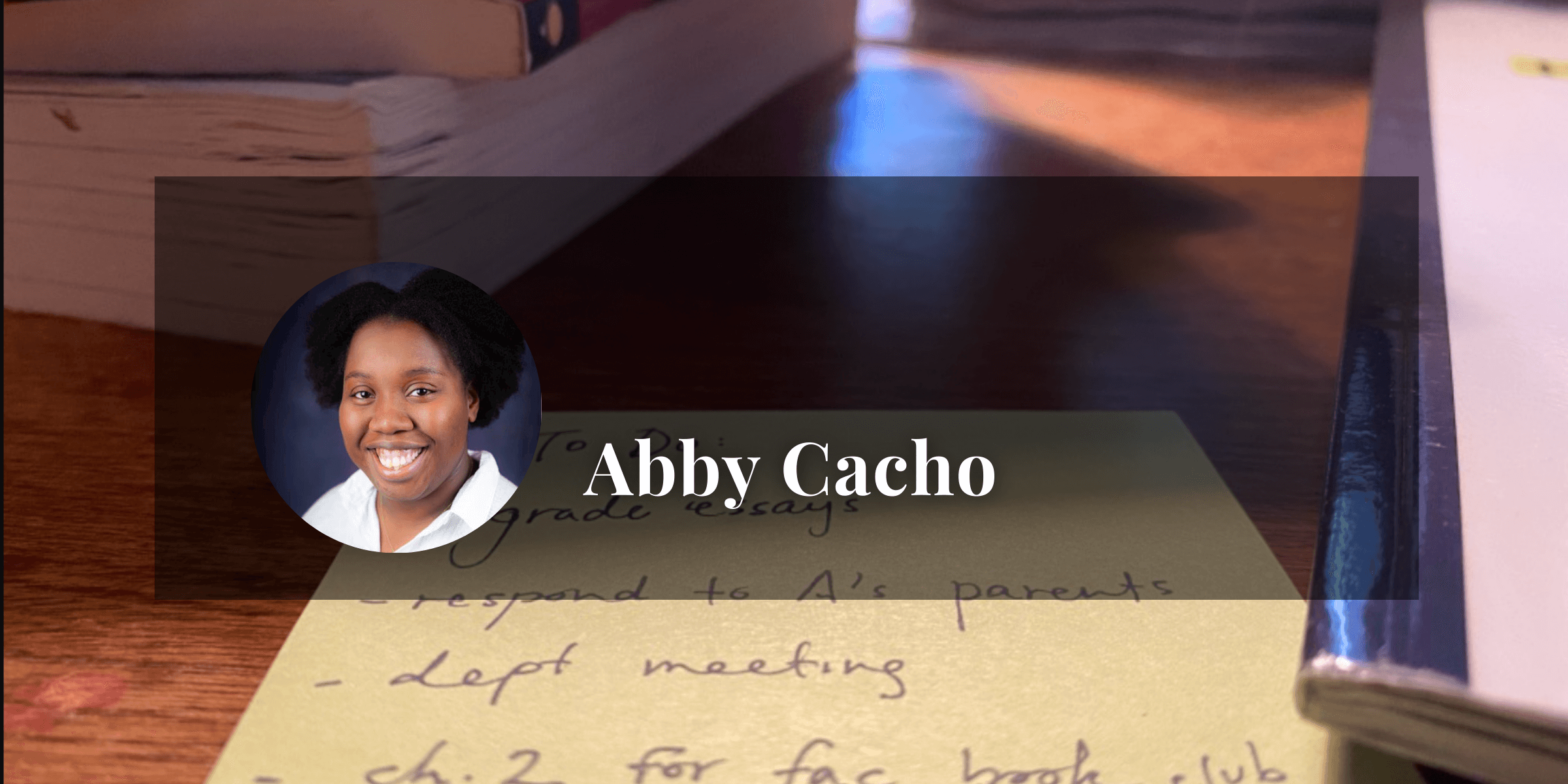Protagonists: Abby Cacho
The Protagonists series highlights the main characters of our mission: the teachers out there hustling to make their students feel known, heard, and challenged through student-led discussion.
Abby Cacho, 10th Grade English / American Studies Teacher at Greenwich Country Day School, Greenwich CT
Hometown Harlem, NY
Favorite teacher growing up: who and why? Two people, Mr. Weeks and Mr. Armes, who were both my advisors at KIPP and Deerfield (Academy), respectively.

I went to KIPP Academy in the South Bronx and I lived in Harlem. KIPP in the South Bronx was the second school that KIPP opened. At the time, KIPP was working on its KIPP-to-College program, which became KIPP-through-college, and then KIPP through college and career. KIPP is a year older than me and has really grown with me. Mr. Weeks and I bonded in 7th grade when I took a practice SSAT and he started to encourage me to consider boarding schools and independent schools. He was my KIPP-through-college advisor, and he’s been a major support system for me.
All knew about boarding school was what I’d seen on Zoey 101. There was this cute 8th grader who I’d known of when I was a 5th grader who went to Deerfield, though, so that admittedly attracted me. Mr. Weeks, he helped me with applications, decisions between schools, and everything else. He was directly in touch with Mr. Armes, who became important in my life at Deerfield. Weeks always kept his eye out for me. He’s always made sure that I’m okay, my family’s okay, that I feel successful. He’s allowed me to define and redefine my definition of success; he’s been there for Plans A, B, C, and D. He just understands and is flexible, not holding me or making me feel like I’m holding myself to one standard of success. Especially when it felt like there was one path for me — corporate America — and I wasn’t sure I wanted to teach, he told me I’d succeed anywhere.
Poppa Armes. I still remember being 13 and his coming to New York to interview me. I felt like I’d just met the best guy in the world, and I had to be at the school he was at. When I got on campus he was no different (a little meaner, I guess, because I’d visit his office to steal M&Ms). My sophomore year, I was his only advisee. He’s been so supportive, so kind — a more realistic guy, where Mr. Weeks was my “you can do anything” voice, Papa was saying “what about this? What about that?” In October of my sophomore year, he took me to Wolfie’s Diner and asked: “what about going to France next year?” I’d barely heard about School Year Abroad; it was a new idea. I was worried that he was trying to get rid of me (because of the M&M’s, ya know?), but he explained to me that I loved French so much, I should consider it. I started to convince all my friends to apply, too, and we ultimately had the chance to live in Europe for a year! Mr. Armes had in mind what was best for me and helped me to see the opportunities I would grow from.
Those are my guys. For their support and reassurance; really, love. They taught me that you can pour love into education.
Describe yourself as a student in three words passionate, analytical, weaver.*
Current City, School, Teaching Assignments (?) Greenwich Country Day School, Greenwich CT, 10th grade English: American Studies.
Favorite historical figure (or best line from history?) Either Audre Lorde or James Baldwin. Both are, first, amazing writers. Lorde really encapsulates for me what it means to grow up in Harlem; I’m amazed by how someone who lived 40-60 years before me could so perfectly describe my neighborhood. Queer Harlem figures, especially, have my heart. James Baldwin has his affinity for France and seeing it as an escape from life here; his want and need to leave America and see it from another point of view, get away, means a lot to me when thinking about my own experience. I always think of that Baldwin quote: “I love America more than any other country in the world and, exactly for this reason, I insist on the right to criticize her perpetually.”
Favorite literary character (or best line from novel?) For today, I’ll go with Moira from The Handmaid’s Tale. I’ve read it 3 of the last 4 years with my 10th graders. There’s a new thing that resonates with me each year. I felt like my students this year overlooked Moira, which is okay. She’s so important for the hope of the novel, for Offred. She’s living her best life as much as one can in Gilead as a sex worker, and as I interrogate my own views about sex work and look through a lens of Hood Feminism, I’ve thought a lot more about Moira and the success she saw in being able to escape the reproducing aspects of Gilead and finding a different way to exist there.
Favorite school supply? I used to be a big fan of the 3-subject or 5-subject notebook. Especially for semester-long classes.
Pet peeve about class (student-led?) discussion? When my students say “can I ask you a question?” because they’re going to ask one anyway. When students say “what I was gonna say was,” because they’re already going to say it. When students say “I’m confused” without any more specific details. I’m thinking: “About what? Tell me why.”
Favorite moment of class discussion? The “OHHHHHH!” the surprise, “big reveal” when students have that lightbulb moment in class and in real time (rather than Zoom). When they don’t shy away from the expressive reaction.
Biggest challenge to good discussion in a virtual classroom? Students’ inability to look at something other than themselves or me. They’re not aware of when another student wants to speak, or what others’ faces look like. They want to know how others are responding to them, yet don’t look up.
Text you count on to inspire conversation? Drown, by Junot Diaz. It’s confused my kids when they’ve read it. They have been so accustomed to one way of thinking about literature and writing that Diaz’s authentic way of expressing himself throws them off guard. Colloquialisms, his mixture of Spanish and English, isn’t something that they’re accustomed to. He challenges, for them, the notion of what it means to be a “good writer.”
What do you nerd out about? Pop culture, social theory, and Critical Race Theory. I also love analyzing and over-analyzing music, especially hip hop, and trying to understand its popularity — who it’s meant for, who it’s popular for, and then the perceived meanings produced by both audiences.
What is your wish for this world? One wish I have for the world is for all people to have the opportunity to be literate — not just to learn to read the words on the page, but to read deeply and interrogate their own thinking as they read.
When historians recount 2020+, what will they be especially fascinated by? The irony is not lost on us that you could not make any of this up. The murder hornets started in April and we were astounded. That the world, just environmentally, became cleaner when we stopped going outside. This whole time is like a crazy story.
One prediction for the future of schools? I predict that schools will eventually lessen the importance of grades for students. As more and more students present with anxiety, depression, and other mental health issues, schools will need to adapt — if we are to teach the students we have in front of us, not the ones we wish they were or have previously had.
Best advice given to you by a department chair or supervisor? My mentor when I worked at Milton Academy (MA) shared that “the kids will be alright; show up and do everything you can.” So many educators have been focused on outcomes, not how school can teach students to think and shift their minds.
Educator-Influencer you count on? First place you turn for classroom advice? My current school is a project-based, interdisciplinary model. We’re looking to make school as cohesive and hands-on as it possibly can be. Right now, I look to relationships — I have a mentor who has a certificate in project-based education, and she is often the one who most helps me out. And then, my teaching team; community matters. Teaching starts with our relationships to one another and trickles down to students.
Better discussions will _______________. Allow students to empathize and challenge their own preconceived notions.






